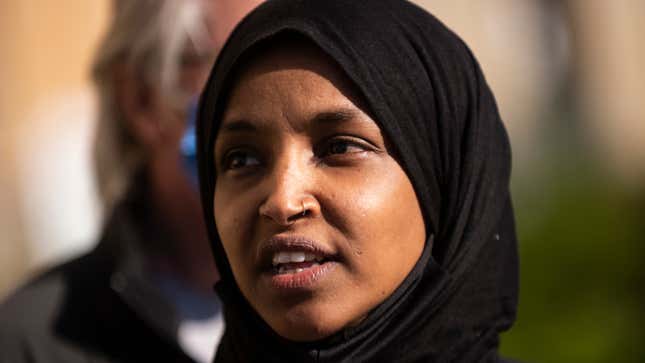Ilhan Omar Deconstructs the Idea of the American Utopia
In Depth

“If you are destined to die, it doesn’t matter how far you travel—you will die. Nothing is permanent, and that fact made me really angry,” Ilhan Omar writes in the opening chapters of her memoir This Is What America Looks Like: My Journey from Refugee to Congresswoman. In this particular passage, Omar is describing the death of her aunt while she and her family were living in the Utange Refugee Camp in Kenya, after fleeing civil war in Somalia. This realization—reached before she was even a teenager—captures the essence of Omar’s memoir. No matter how much hope or promise or safety a place offers, death is inevitable. Anger is acceptable. But it’s still worth it to strive for something greater. For Omar, that something greater is the vision of an America she was promised when she immigrated from Utange, an America where anyone can become an American and have a say in their government. An America where every voice counts, no matter one’s birthplace or religious affiliation.
Omar’s memoir doesn’t just revel in her triumph as one of the first Muslim women elected to Congress; it’s also a vivid retelling of her life as a young refugee and depicts her attempts to take the promise of America and bring it to fruition by confronting the country’s shortcomings head-on. Omar’s account of escaping civil war in Somalia as a girl is a visceral and vital testimonial. “We’ll get to our America,” Omar’s father told her. While he meant the statement geographically, the sentiment remains with Omar as she continues her work to deconstruct an America that has not lived up to its promise.
Omar was eight years old when war broke out in Somalia. “One day everything was okay, and the next, there were bullets piercing not only buildings but people,” she recounts. Her father’s clan, the Majerteen, became a target of violence in the power struggle after dictator Mohammed Siad Barre’s ousting in 1991. To keep his family safe, Omar’s father gathered their extended family in their Mogadishu home, and Omar was instructed to lie about her ethnicity to move about safely. “Although the Benadiris (my mother’s side of the family) were not caught up in this clan-based conflict, the Hawiye systematically targeted my father’s northern-based clan, the Majerteen.” But that wasn’t enough to protect them.
One day, when Omar and her brother were sent outside on an errand, they were stopped by armed men demanding to know their clan. Omar delivered a rehearsed lie, claiming her great grandmother’s clan. Unsatisfied with her answer, the men asked her to specify her lineage; “I wasn’t about to adlib a sub-clan only to have men with guns realize I was a liar,” she writes. The men ultimately allowed Omar and her brother to pass, but told the children, “Don’t expect to come back another time without being able to tell us who you are.” It was the last time Omar was allowed to leave her home. The encounter made it clear that even at eight years old, Omar wasn’t safe: “My grandfather’s notion that being children would protect us from harm had been destroyed along with every other system and institution we had thought permanent,” she writes. “There was no more news, no school, no mosque, no hospitals.”
-

-

-

-

-

-

-

-

-

-

-

-

-

-

-

-

-

-

-

-

-

-

-

-

-

-

-

-

-

-

-

-

-

-

-

-

-

-

-

-








































